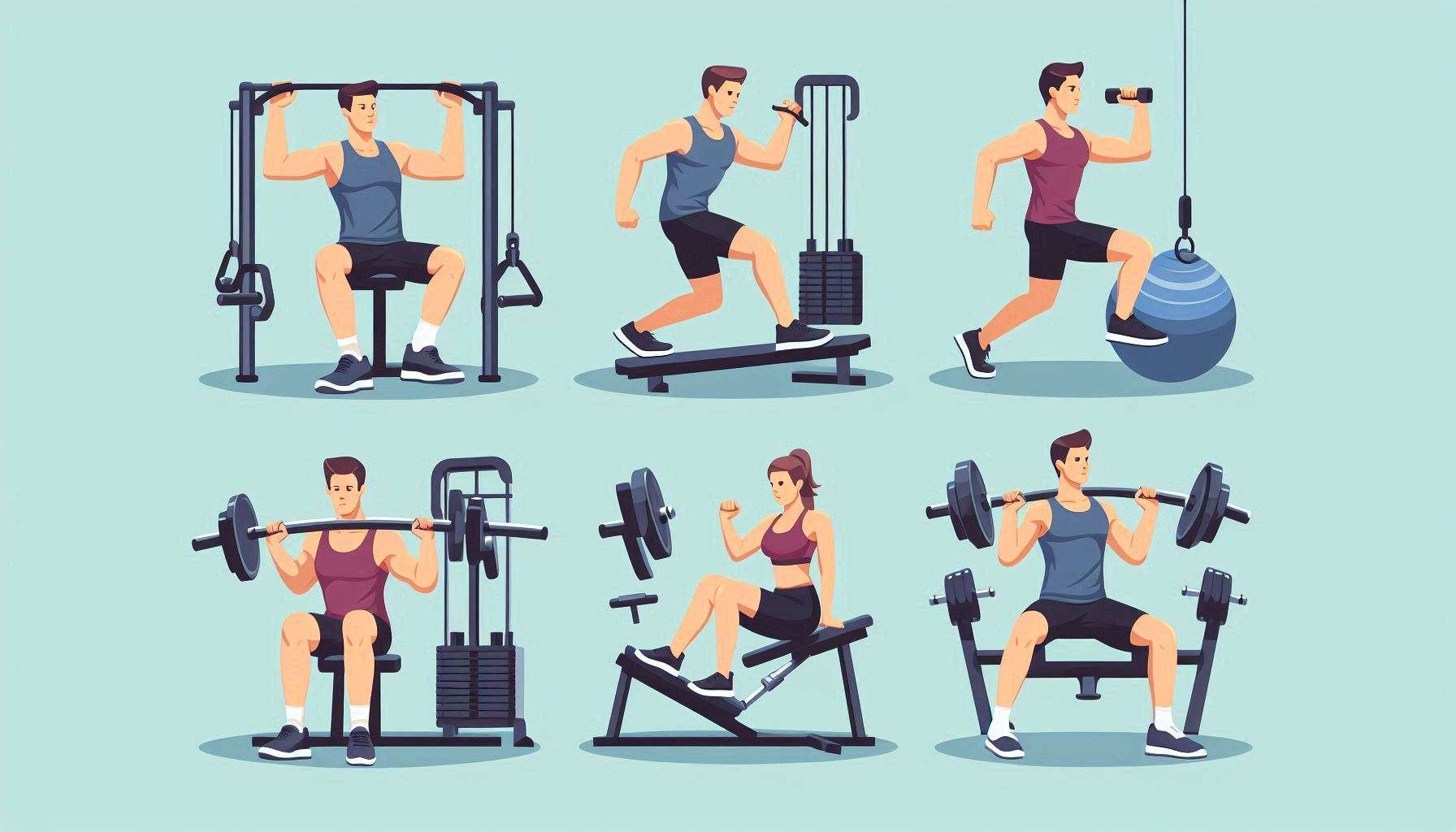Fitness and Exercise: The Foundation of a Healthy Lifestyle
Why Fitness and Exercise Matter
Understanding the importance of exercise and wellness is the first step toward a healthier and more vibrant life. It’s not just about looking fit—it’s about feeling strong, reducing stress, living longer, and performing daily tasks with ease. Regular workouts significantly enhance cardiovascular health, increase muscle and bone strength, and help manage weight effectively.
Moreover, physical activity plays a vital role in mental health improvement, helping reduce anxiety and depression while boosting overall mood. Making exercise a daily habit is one of the most effective ways to take control of your health and achieve lasting wellness.
Finding the Right Fitness Routine for You
The world of fitness is incredibly diverse, offering solutions for every age, body type, and fitness level. Whether you prefer home workouts, gym sessions, yoga, or group fitness classes, there are countless ways to stay active and motivated. The key to success is discovering a routine that fits your lifestyle and staying consistent.
From simple daily stretches to high-intensity interval training (HIIT), there’s something for everyone. By making physical activity a priority and setting realistic goals, you can experience life-changing benefits such as better health, increased energy, sharper focus, and a more positive outlook.
Understanding the Basics of Fitness and Exercise
Creating a Sustainable Workout Routine
The key to long-term success in any fitness journey is consistency, patience, and proper planning. For beginners, it’s crucial to start with manageable goals and gradually increase the intensity and frequency of workouts over time.
Setting realistic fitness goals, tracking your progress, and celebrating small milestones can help you stay motivated and committed. Whether your focus is on weight loss, muscle building, or simply feeling healthier, developing a clear routine is essential.
Don’t forget the importance of rest and recovery. Overtraining can lead to fatigue and injury, so it’s vital to listen to your body and include rest days in your weekly schedule. Balanced training combined with adequate recovery ensures optimal performance and prevents burnout.
With the right mindset, structured planning, and a mix of different workout styles, anyone can embrace a fitness lifestyle that leads to long-term health, strength, and well-being.
The Role of Nutrition in Fitness and Exercise
Optimizing Your Diet for Exercise Performance
A well-planned diet can dramatically boost the effectiveness of your fitness efforts. For example, consuming protein-rich foods after a workout helps repair and rebuild muscle tissue. Including complex carbohydrates replenishes glycogen stores and restores energy levels, while healthy fats support hormonal balance and aid in nutrient absorption.
By focusing on a diet rich in nutrient-dense whole foods and minimizing processed foods and added sugars, individuals can improve exercise endurance, boost muscle recovery, and support long-term health. The timing of meals also matters—eating a pre-workout meal with protein and carbs can improve performance, while a balanced post-workout meal aids recovery and reduces soreness.
How Nutrition and Fitness Work Together
The relationship between nutrition and physical fitness is deeply interconnected. As your activity levels increase, so do your nutritional needs. Athletes and fitness enthusiasts often need to adjust their intake of calories, protein, and other nutrients to match their energy output and support muscle repair.
Likewise, maintaining a strong diet enhances the benefits of fitness by supplying the body with the fuel it needs to perform and recover efficiently. Understanding this dynamic allows individuals to make informed choices about what they eat, helping them achieve better performance, maintain muscle mass, and reach their health and wellness goals.
How to Create a Personalized Fitness and Exercise Plan
Leveraging Technology to Enhance Your Fitness Plan
Modern fitness apps and wearable fitness technology can play a vital role in creating and maintaining your personalized fitness plan. Many apps offer tailored workout programs, nutritional guidance, and progress tracking to keep you motivated and on course. Wearable devices such as fitness trackers and smartwatches monitor physical activity, heart rate, sleep patterns, and other health metrics, providing valuable insights to optimize your training.
By integrating these advanced tools into your routine and staying committed, you can customize your fitness journey to meet your unique needs and preferences, ultimately leading to sustainable and rewarding results.
ncorporating Mental Health into Fitness and Exercise Routines for Overall Well-Being
The mental health benefits of exercise come from multiple factors, including the release of endorphins—natural “feel-good” hormones—and the distraction from everyday stressors that physical activity offers. Moreover, social engagement during group workouts helps combat loneliness and isolation, further supporting mental well-being. By prioritizing mental health in fitness plans, individuals can adopt a holistic approach to health that nourishes both body and mind.
Boosting Mental Health with Outdoor Fitness Activities
Exercising outdoors amplifies the mental health advantages of physical activity. Spending time in nature reduces symptoms of anxiety and depression, improves overall mood, and lowers the risk of psychiatric disorders. Outdoor workouts like hiking, gardening, or walking in parks provide calming effects and enhance emotional well-being. Incorporating outdoor fitness activities into your routine not only improves physical health but also nurtures a profound sense of mental wellness.
How to Sustain Motivation in Fitness and Exercise for Long-Term Success
Preventing Workout Boredom and Staying Engaged
To avoid fitness plateaus and boredom, it’s important to vary your exercise routine by trying new activities and incorporating diverse workouts. Rewarding yourself for reaching milestones—such as buying new workout gear, enjoying a relaxing post-workout massage, or treating yourself to healthy snacks—can also strengthen motivation and keep your fitness journey exciting.
Educate Yourself to Boost Fitness Motivation
Staying informed about the latest fitness trends, understanding injury prevention, and learning the benefits of different exercise types can deepen your engagement and commitment. Recognizing that setbacks and challenges are natural parts of any fitness journey helps maintain a positive mindset. By focusing on consistent progress rather than perfection, seeking support when needed, and celebrating achievements, you can sustain your motivation and make fitness and exercise a lifelong habit.
Overcoming Challenges in Fitness and Exercise: Tips for Lasting Success
Breaking Through Fitness Plateaus
Plateaus, where progress slows or stalls, are common but can be overcome by modifying workout routines. Increasing exercise intensity, incorporating new workout variations, or adding strength training can reignite progress and challenge the body in new ways.
Professional Guidance and Community Support
Seeking expert advice from a personal trainer, nutritionist, or healthcare provider can provide personalized guidance, realistic goal setting, and effective strategies to stay motivated. Additionally, joining fitness communities or support groups—whether in-person or online—can offer encouragement, accountability, and valuable tips from others on a similar fitness journey.
By recognizing that setbacks are normal and embracing a solution-focused approach, individuals can successfully navigate common fitness challenges and continue making steady progress toward their health and wellness goals.
—-AISmartWord



https://t.me/pt1win/264
Актуальные рейтинги лицензионных онлайн-казино по выплатам, бонусам, минимальным депозитам и крипте — без воды и купленной мишуры. Только площадки, которые проходят живой отбор по деньгам, условиям и опыту игроков.
Следить за обновлениями можно здесь: https://t.me/s/reitingcasino
https://t.me/iGaming_live/4592
https://t.me/s/iGaming_live/4673
https://t.me/s/reyting_topcazino/19
https://t.me/s/reyting_topcazino/22
https://t.me/of_1xbet/874
https://t.me/s/ef_beef
https://t.me/s/officials_pokerdom/3189
https://t.me/s/be_1win/808
https://t.me/s/ezcash_officials
Finally found a decent spot for esports betting! fun88esport seems to know their stuff. Good odds, plenty of games to choose from. Definitely giving them a shot. Check out fun88esport!
Saw play karo.com mentioned online and wanted to give it a whirl. I’m enjoying their website and the variety of games. I hope to deposit more soon. Give it a look: play karo.com.
Downloading the jlph app now. So much easier to play on my phone while stuck in traffic. Let’s see if it’s legit! jlph app
Just discovered the h2 rewards program on h2 poker and I’m already loving it! Earning points while playing poker? Yes, please! The rewards are pretty awesome too. Don’t miss out! You can check it out here h2 rewards